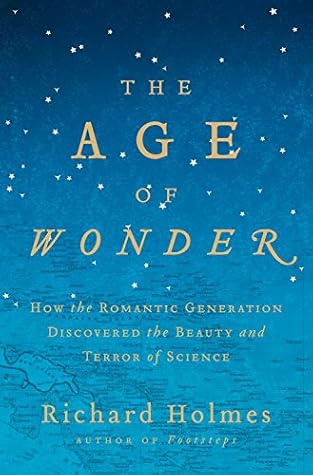More on this book
Community
Kindle Notes & Highlights
Read between
August 17 - September 26, 2017
The idea of the exploratory voyage, often lonely and perilous, is in one form or another a central and defining metaphor of Romantic science.
The notion of an infinite, mysterious Nature, waiting to be discovered or seduced into revealing all her secrets, was widely held.
The only Tahitian practice that Banks found totally alien and repulsive was that of infanticide, which was used with regularity and without compunction as a form of birth control by couples who were not yet ready to support children.
Banks’s personal enthusiasm as the universal scientific patron largely shaped and directed the adventurous character of Romantic science,
What in fact he had observed was the seventh planet in the solar system, beyond Jupiter and Saturn, and the first new planet to be discovered for over a thousand years (since Ptolemy).
Nevertheless, Herschel’s discovery was an astonishing feat. It became his professional signature, and a historic moment for cosmology. It is hardly surprising that over the years he continued romantically to refine the story, and compressed his discovery into a single wondrous night, the inspired work of a glorious ‘few hours’. Caroline never commented on this, although it seems clear that she was present during the critical nights of measuring between 21 March and 6 April 1781. The effect of this account was to present an engagingly romantic image of science at work: the solitary man of
...more
What he has to show is indeed a long way off, and perhaps concerns us little, but all truth is valuable and all knowledge pleasing in its first effects, and may subsequently be useful.’
Ballooning produced a new, and wholly unexpected, vision of the earth. It had been imagined that it would reveal the secrets of the heavens above, but in fact it showed the secrets of the world beneath. The early aeronauts suddenly saw the earth as a giant organism, mysteriously patterned and unfolding, like a living creature. For the first time the impact of man on nature was clearly revealed: the ever-expanding relationship of towns to countryside, roads to rivers, cultivated fields to forests, and the development of industry. It was comparable to the first views of the earth from space by
...more
In this paper, astronomy changed decisively from a mathematical science concerned primarily (for practical purposes) with navigation, to a cosmological science concerned with the evolution of the stars and the origins of the universe.
He later observed wryly of this time: ‘The first step towards the attainment of real discovery was the humiliating confession of ignorance.’12
Keats joined in, agreeing that Newton had ‘destroyed all the poetry of the rainbow, by reducing it to a prism’.
Mary’s brilliance was to see that these weighty and often alarming ideas could be given highly suggestive, imaginative and even playful form.
By relating the human predicament to the scientific solution, Davy produced one of the great demonstrations of scientific ‘Hope’. He showed that applied science could be a force for good previously unparalleled in human society, and might gradually liberate mankind from untold misery and suffering.
Though clearly fitting into a recognisable pattern, in which a highly rational man develops intense mystical longings towards the end of his life, it carried a true sense of humanity and hope.
The point was that science must always be more than the simple observation of phenomena or data. It was simultaneously a subjective training in observational skills, self-criticism and interpretation: a complete education.


